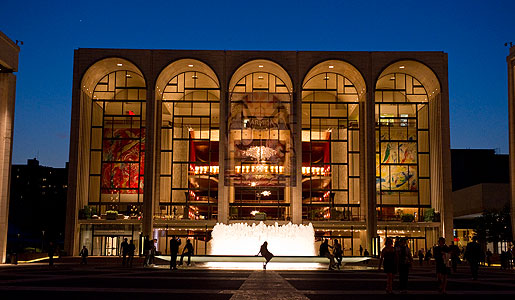Update, 8/1: Negotiations have been extended 72 hours, according to a release from the Met. New contracts for three of the unions, representing call center workers, building engineers, and ushers, ticket takers, porters, security guards and office workers, have been drawn up, with 12 more contracts still being negotiated.
Singers, musicians and stage hands at the Metropolitan Opera face the prospect of a lockout just seven weeks before opening night as contracts for 15 of their 16 unions expire at midnight.
The New York City-based Metropolitan Opera is negotiating all day with representatives of its three largest unions “in the hope that we will be able to agree to new contracts before midnight and continue preparations for our 2014-15 season without a work stoppage,” Met spokesman Sam Neuman said. The three unions represent the chorus and singers (American Guild of Musical Artists, AGMA); orchestra (American Federation of Musicians Local 802); and stage hands (International Alliance of Theatrical Stage Employees Local One).
At the center of negotiations is a cost-saving measure proposed by the Met that would reduce pay to its three largest union groups by 16 to 17 percent per year by reducing the number of work rules, which require the Met to pay employees extra based on certain conditions. Those percentages would work out to between $52.3 million and $55.6 million in expenses based on the Met’s 2013 budget.
Work rules specifically called out in the proposal include:
- Fulfillment of weekly performance guarantees before overtime for rehearsals;
- Removal of penalty payments for costume changes; and,
- Reduction of vacation pay.
The organization’s $253 million endowment in 2013 “is far too small” compared to its operating budget of more than $326 million for the same year, according to the Met’s proposal to unions, and “borrowing to finance the difference between revenues and expenses is not a solution.”
While lockouts are not common in the arts, they’re not unheard of. “It’s a last resort, and should be,” said Robert Lynch, president and CEO of Americans for the Arts in Washington, D.C. “A lockout or a strike, either way it puts negotiations in an adversarial position. Organizations try to avoid them because that means you’ve reached a real trouble spot.” The Met has had entire seasons canceled, in 1969 and 1980, according to Lynch.
Between 2006 and 2013, expenses have ballooned 67 percent, from $221.6 million to $326.8 million. Last year more than $214 million of those expenses were related to unions, including $132.1 million for payroll. Box office revenues declined, from 92 percent attendance and $98 million in 2008 to 79 percent attendance and $94 million in 2013. Expenses outstripped revenue in four of the last five years.
“All of the largest opera companies have seen costs increase faster than the cost of living,” said Marc Scorca, president and CEO of Opera America in New York City. “The cost of living is kept low through efficiency in technology through industry. There are fewer people needed to make a car because of robotics. That can’t happen in opera. The cost of living is also kept lower because of goods imported from abroad. Industries have moved things overseas. You can’t do that in opera. The chorus can’t sing in another country.”
Scorca also noted that in general, opera ticket sales have declined over the last 10 years, with some exceptions, such as Chicago, Houston and Santa Fe. The New York City Opera, considered “the people’s opera” and much smaller than the Met, last year filed for Chapter 11 bankruptcy.
The American Federation of Musicians Local 802 released a 93-page report accusing General Manager Peter Gelb of “failed management and flawed artistic vision.”
“The report analyzes the dismal reception of Gelb’s expensive new productions by opera critics and patrons and also recommends specific strategies the Met could employ to save $20 million annually by curtailing Gelb’s lavish spending and realizing scheduling efficiencies,” according to a release that accompanied the report.
The Local 802 report puts forth a proposal to save the opera $32.3 million. The most significant items include cutting the number of productions from six to five ($10.7 million) and lowering ticket prices to sell more seats ($11.6 million).
Lynch said the arts are experiencing a “dual reality” of astounding growth and funding challenges over the last 50 years. “If you look at the long picture of the last half-century or more, you’ll see amazing growth in the number of nonprofit arts organizations,” he said. Today, they number almost 100,000, compared with about 7,000 in 1965, when Americans for the Arts was established.
At the same time, arts organizations struggle to generate revenue to meet ever-rising expenses. “Arts organizations are more reliant on earned income, and that makes them different than other parts of the (nonprofit) sector,” said Lynch. “It’s different for every organization, every region, every market, but somewhere between 50 and 60 percent of their incomes are coming from things they sell, whether that’s tickets or items in a museum store. In a lower economy, people are more careful with how they spend their money, so that’s lower earned income.”
